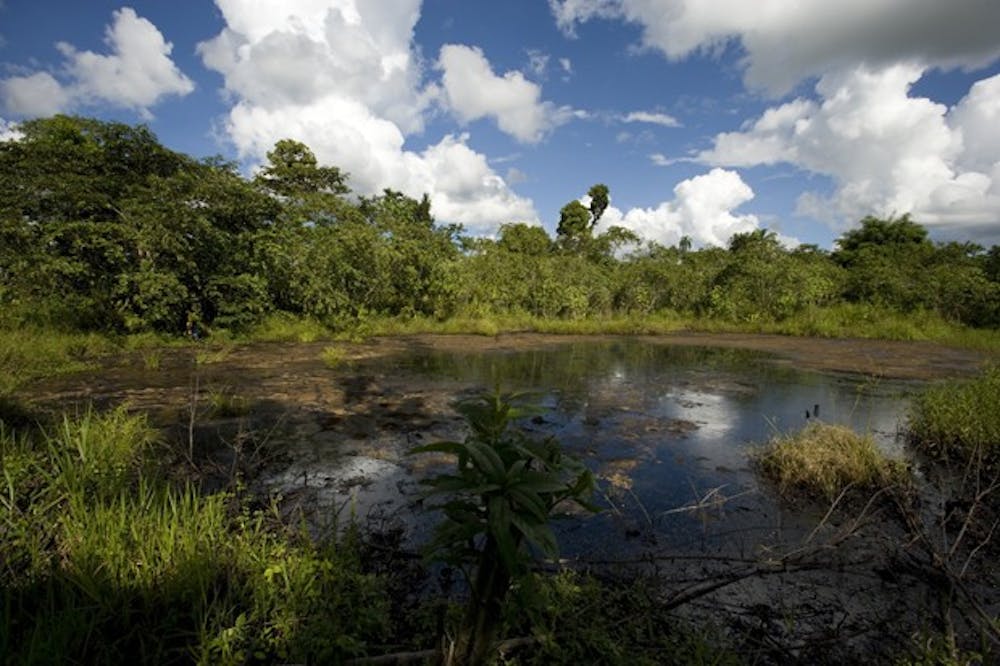The documentary “CRUDE” follows the lawsuit 30,000 Cofán people of Ecuador have brought against Chevron for polluting their communities with oil.
The polluted area, about the size of Rhode Island, is so pervasive that the people are literally drinking and breathing oil.
“I think the worst thing that I saw was these rashes on babies,” director Joe Berlinger said in an interview with The Eagle. “Fifteen or 16 out of every 20 babies have these terrible skin rashes. There’s no fresh drinking water there.”
Berlinger hoped the documentary would introduce Americans to a different lifestyle.
“We take for granted that we can go to our taps and get a glass of water,” he said. “They drink from the rivers and streams of the areas, and there’s just no fresh drinking water.”
When water samples were being taken for testing from a well, one man said that it smelled like gasoline. The images of pollution are enough to make stomachs turn on their own, but these descriptive details bring the viewer closer to the devastation.
This polluted water is causing cancer. In one of the most painful moments of the film, a mother explains that her young daughter has cancer because they have unknowingly been living on top of an old oil pit, and that the family does not have the money to pay for her treatment. The mother explains that she tried to raise chickens to pay for her daughter’s treatment, but the pollution killed them before they were of any use.
After seeing the heinous effect the pollution had on his community, Pablo Fajardo decided to do something about it.
“[Fajardo] was poor, worked in the oil fields [and] saw all the injustice around him, saw the environmental destruction, but unlike many of us who would just shrug our shoulders and say ‘What can I do?’ he decided to do something about it,” Berlinger said. “[He] got himself educated, became a lawyer and his very first law case as a lawyer is against the fifth largest company in the world ... He was a hero to me, and I wanted to make a film about him.”
Berlinger wasn’t planning on filming “CRUDE.” The plaintiffs’ attorney, a fan of Berlinger’s previous film about Metallica, approached him about the situation and suggested it as a documentary.
“It didn’t jump out at me as an obvious film I would be making, but he was convinced that if I saw the pollution I would have a change of heart,” Berlinger said. “I agreed to take a trip down there and once I saw the pollution ... I decided it was something I had to tell people about.”
While the lawsuit creates the narrative that holds the story together, the documentary has just as much to do with the indigenous people being exploited.
“The lawsuit’s an excuse to make the film,” Berlinger said. “You walk around these indigenous villages [and see] innocent people who have lived in harmony with nature and you see what the impact has been on them through our consumption habits and the way oil companies behave in that region.”
Berlinger and his team even braved dangerous conditions for the documentary, such as the prevalent malaria, but that was only one of the dangers in making the film.
“We were, at times, very close to the Columbian border because Ecuador and Columbia have a border dispute because of the oil,” Berlinger said. “That border area is very dangerous. [There are] anti-government guerillas that roam the region, and they kidnap Americans sometimes. There [are] drug runners [and] a lot of drug activity ... Just the fact that this film got made at all under those conditions is pretty miraculous.”
As of now, it looks as though the lawsuit will take another 10 years. But, while it continues, the pollution continues to contaminate these communities and no one cleans up the mess.
“Unfortunately, nobody is actually cleaning up the pollution because that’s what the lawsuit’s about,” Berlinger said. “Trudie [Styler]’s freshwater project is really the only tangible thing that has been brought to these people.”
Styler has started a project to provide drinking water to the people of Ecuador by providing large tanks that store purified rainwater. While this isn’t cleaning up the pollution, it is giving some people fresh water that they would not have access to otherwise.
During the time the Cofán people are receiving some help, the pollution will affect three generations before the case is brought to an end, and the process of cleaning up will take even more time.
“I think the ideal outcome is for Americans to develop a greater sensitivity to our unbridled consumption, [which] has a deep impact on other people around the world,” Berlinger said.
The film will only be playing for one week in D.C. at the Landmark E Street theater, starting Friday, Oct. 23.
You can reach this writer at thescene@theeagleonline.com.





